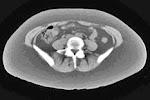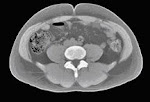Research indicates that abdominal fat cells are biologically active. In simple words, this means fat functions as an endocrine organ or gland, producing hormones and other substances that can affect the health. Although scientists are still to fully understand the roles of individual hormones, excess abdominal fat is confirmed to interfere with the normal balance and functioning of hormones.
Visceral fat also generates immune system chemicals called cytokines — two examples would be tumor necrosis factor and interleukin-6 — that can increase the risk of cardiovascular disease. Such biochemicals produced in the body can have harmful effects on cells’ sensitivity to insulin, blood pressure, and blood clotting.
Excess visceral fat is considered really harmful probably because of its location near the portal vein, which carries blood from the intestinal area to the liver. Substances released by visceral fat, including free fatty acids, enter the portal vein and travel to the liver, where they can influence the production of blood lipids. Visceral fat is directly linked with higher total cholesterol and LDL (bad) cholesterol, lower HDL (good) cholesterol, and insulin resistance.
You can read more on the harmful effects of abdominal fat here.
Now that we know how important it is to fight the fat, the starting point for bringing weight under control, in general, and combating abdominal fat, in particular, is daily moderate-intensity physical activity — at least 30 minutes per day (ideally up to 60 minutes per day) to control weight. Strength training (exercising with weights) may also help fight abdominal fat. Spot exercising, such as doing sit-ups, can tighten the abdominal muscles and pull the belly in, but it won’t burn the visceral fat.
As regards the diet, pay attention to your BMR & TDEE, and emphasize complex carbohydrates (fruits, vegetables, and whole grains) and lean protein over simple carbohydrates such as white bread, polished white rice, and aerated soft drinks. Replacing saturated fats and trans fats with polyunsaturated fats can also help.
Subscribe to:
Post Comments (Atom)


No comments:
Post a Comment